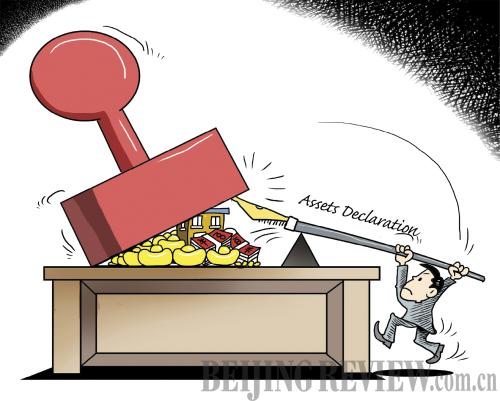|
 |
|
(CFP) |
Wu Yuliang, Deputy Secretary of the CCDI, said at a press conference in June 2011 that two mechanisms were vital for the system to be introduced—one would cover social credit, information such as loan and credit history, and the other would highlight personal information. Both needed to be up and running before officials were required to disclose personal assets to the public, according to Wu.
"Any good system has to have accompanying measures and a proper environment to become feasible," Wu said, adding that it will be difficult to implement the system in China without these two mechanisms because the public will not trust accounts provided by officials if they don't have access to relevant statistics.
Wu, however, said that assets declaration was a common part of anti-graft measures in many countries and had proved effective. "We are confident about setting up such a system," Wu said.
According to the CPC Central Committee's anti-corruption guidelines for 2008-12, the Party will accelerate research and evaluation efforts to set up the system, though there is more research and evaluation work to be done.
"According to the reply from the CCDI, we need to disseminate knowledge, change people's thinking, and establish a favorable social atmosphere for the launch and implementation of the system," Han said. "Based on the reality of China, adequate studies and research for the system's design are needed. The scope of the declarations, whether the assets declaration results should be open to the public, and what steps are needed to implement this system, need to be determined."
For Han, a moderate, rational stance needs to be adopted by all parties. "National legislation will act as a very powerful signal for all officials, who will in time realize that having their assets open to the public is not only a moral obligation, but a legal duty," he said.
While enacting nationwide transparency legislation may take some time, targeted pilot programs have emerged as a possible means of forcing officials in key industries to declare their assets.
Programs that target officials who make decisions on huge spending plans or contracts, as well as those dealing with construction companies and real estate projects, have been suggested as an interim step before broader national legislation is enacted.
Supporters of pilot schemes argue that if the top-level leaders of key departments are monitored, a precedent for greater transparency will be set throughout the civil service.
"Civil servants differ widely in terms of their power and scope for corruption, treating them in a completely uniform manner is inefficient and therefore the enforcement of any policy should not be completely rigid," Han said.
In recent years, a handful of local governments have implemented pilot programs requiring officials, albeit mostly at fairly low levels of the government, to post information about their finances.
In 2009, the local government of Jiangbei District in Chongqing demanded that new civil servants declare their property holdings.
In central China's Hubei Province, disciplinary authorities have set up a work team to research an assets declaration program for government officials.
Trial assets declarations would be carried out in six cities in the province from May this year, according to provincial government sources. The CPC Hubei Provincial Commission for Discipline Inspection and the Department of Supervision of Hubei Provincial Government have formulated an action plan, which has won approval from central authorities.
But while the local initiatives have been widely applauded, the extent of their openness has been questioned. In almost all trials, information has only been posted on government websites for a short time, and without lists of properties under the names of spouses and children of involved officials.
Verifying the accuracy of officials' declarations presents another problem.
"The biggest difficulty lies in the conflict between legal items and reality," Han said. "Some officials have substantial gray income. If they declare their assets truthfully a huge discrepancy will emerge between their official salaries and their assets. I don't think ordinary citizens will accept these discrepancies."
Though a comprehensive assets declaration system is expected to prevent these discrepancies from emerging in the future, questions remain over how past discrepancies in salaries and assets should be handled.
"The focus should be on prevention not on punishment as this would lead to officials actively working against the introduction of the system," Han said.
Han believes that the internal income reporting system for high-ranking officials since 1995 has laid a solid foundation for greater transparency. "The earlier we do it, the better. The later this legislation, the heftier a price we will pay," he said.
Email us at: yinpumin@bjreview.com | 